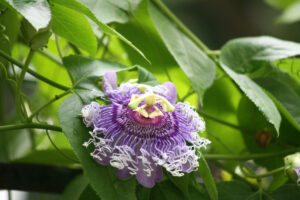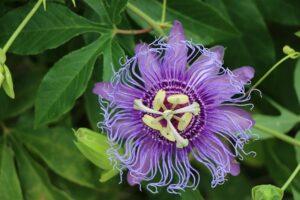Passionflower is a traditional herbal remedy with potential benefits for anxiety, inflammation, sleep, digestion and pain. Speak to your healthcare provider before taking it as it may interact with medications. Read on about the medicinal benefits of passionflower.

History of Passiflora Incarnata
Passion Flower (Passiflora Incarnata) is a beautiful and unique plant that has been beloved by gardeners for centuries. It is native to the Southern United States and Mexico but can be found in many other regions around the world. The name comes from the fact that the delicate flowers of this vine resemble Jesus Christ’s crucifixion; its stems, sepals and petals look like a crown of thorns, its petal arrangement looks like nails on the cross, and its five stamens represent the wounds.

Growth Habits and Fruit
Passionflower is an evergreen, perennial vine that can grow up to 30 feet long and produces large, showy flowers in shades of white, pink, lavender or blue. Flowers typically bloom from late spring to mid-summer, adorned with delightful fruits known as maypops or passion fruit. These round fruits, about the size of a hen’s egg, offer a delightful balance of sweetness and tanginess. They can be enjoyed fresh or used to create exquisite jams, jellies, and refreshing beverages. Embrace the beauty of these blossoms and savor the flavors of nature’s bounty. This article belongs to pineyriverhomestead.com published 9-8-23
Medicinal Benefits Passionflower (Passiflora Incarnata)
Passionflower (Passiflora Incarnata) is not only aesthetically pleasing but also has many medicinal benefits. It contains a variety of active compounds that can help reduce anxiety, promote relaxation and sound sleep, and provide relief from inflammation. Passionflower extracts have been used in traditional medicine to treat insomnia, hysteria and epilepsy as far back as the 16th century. More recently, studies have shown that passionflower can be effective in treating anxiety disorders such as generalized anxiety disorder (GAD) and obsessive-compulsive disorder (OCD). It may also help reduce symptoms of attention deficit hyperactivity disorder (ADHD).
The above and following information is meant to be informative and entertaining. It is in no way meant as medical advice. Please always speak to your medical provider before using any herbal. Just because it is natural or over the counter does not mean it cannot hurt you.
Active Compounds Found in Passionflower
Passionflower contains a variety of active compounds, including flavonoids, alkaloids, and glycosides.
Flavonoids in Passionflower
Flavonoids are antioxidant compounds that can help protect the body from oxidative stress caused by environmental toxins, and may also play a role in reducing inflammation. One flavonoid found in passion flower is Chrysin, which helps reduce anxiety-related symptoms such as fatigue and insomnia. Additionally, Luteolin is another flavonoid with anti-inflammatory properties known to reduce the risk of cardiovascular disease.
Alkaloids and Glycosides Found in Passionflower
In addition to flavonoids, passion flower contains several alkaloids such as harmane and harmaline which are known to have sedative effects. These compounds can help reduce anxiety and promote relaxation. The plant also contains several glycosides such as vitexin and isovitexin, which have been studied for their potential anti-inflammatory effects. Additionally, these compounds may also help reduce the risk of certain types of cancer.
These compounds can influence the activity of neurotransmitters in the brain which are responsible for maintaining balance and calmness. Additionally, passionflower’s flavonoid content helps it to act as an antioxidant, protecting cells from oxidative damage .
How to Use Passionflower
Passionflower can be consumed in a variety of forms including teas, tinctures, capsules and extracts. It is important to follow the instructions on the label when consuming any type of passion flower supplement. Additionally, it is recommended to start with a lower dose and increase gradually as needed in order to avoid potential side effects. Passionflower can also be used topically as an oil or cream for skin issues such as eczema and psoriasis. When using passionflower topically, it is important to dilute the oil in a carrier oil such as almond or coconut.
Tinctures are a great way to add passionflower into your routine. To make a tincture, combine 2 tablespoons of dried passion flower in 1 cup of vodka or brandy. Let this mixture sit for 4-6 weeks in a dark place before straining and storing in the refrigerator. To use the tincture, it is recommended to take 1/4 teaspoon in a glass of water up to three times per day.
To make passionflower tea, simply steep 2 teaspoons of dried herb in 1 cup of boiling water for 10 minutes. This tea can be consumed up to three times daily or as needed.
Potential Side Effects of Passionflower
Although passion flower is generally safe, certain people may experience side effects such as drowsiness, dizziness, and nausea. It is also important to note that passion flower can interact with certain medications and should be avoided by those taking blood thinners or MAO inhibitors. Additionally, due to a lack of research in pregnant and breastfeeding women, it is not recommended for these groups. Finally, passionflower should be avoided if you have an allergy to other members of the Passifloraceae family such as chrysanthemums or marigolds.
Passionflowers Potential Benefits
In addition to its potential calming and anti-anxiety effects, passionflower has many other potential health benefits. Studies have shown that it may help reduce inflammation, lower blood pressure, improve sleep quality and aid in digestion. Additionally, it is rich in antioxidants which can help protect the body from damage caused by free radicals. Finally, some studies suggest that passionflower may help with certain types of pain, including headaches and migraines.
Passionflower Potential Interactions
Passionflower is known to interact with some medications and supplements, so it is important to speak to your healthcare provider before taking any kind of passionflower supplement. People taking anticonvulsants should not take passionflower as it can increase the sedative effect of these medications. Additionally, people taking MAO inhibitors or blood thinners should avoid passionflower as it may increase the risk of bleeding. Finally, if you are taking any kind of sedative medication, talk to your healthcare provider before combining it with passionflower as it can further enhance the sedating effects.
Conclusion
Passionflower is a traditional herbal remedy that has been used for centuries to treat anxiety and promote relaxation. It may also have potential benefits in reducing inflammation, improving sleep quality, aiding digestion and treating certain types of pain. However, it is important to talk with your healthcare provider before taking Passionflower or any other supplement as it can interact with some medications and supplements.
Note: This content is for informational purposes only and should not be considered medical advice. As always, consult with your healthcare provider before making any changes to your diet.
For more about the medicinal property of herbs click here.
For information on how to grow passionflower click here.
References:
https://europepmc.org/article/MED/12244887
https://pubmed.ncbi.nlm.nih.gov/18499602/

